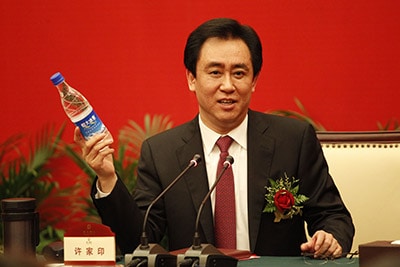
Evergrande has put Chinese celebrity Fan Bingbing to work in promoting its spring water
Evergrande Real Estate Group, a top-five Chinese developer noted for its daring approach to finance, announced recently that it has applied and received approval to list its bottled water subsidiary, Evergrande Spring, on China’s New Third Board.
The bottled water company is one of a number of new businesses that Evergrande has started in the last two years as it attempts to diversify away from China’s slowing property industry. The planned listing is the third instance in the last thirty days of Evergrande applying to list non-core subsidiaries on the NEEQS (National Equities Exchange and Quotations System) exchange, as the New Third Board is officially known.
While still one of China’s largest and best-known real estate companies, Evergrande has frequently drawn scrutiny from analysts for having one of the highest level of debt in the industry, as well as for classifying some of its debt as equity on its balance sheet.
Small Board Listings for Evergrande’s New Subsidiaries
Evergrande Spring was one of the earliest in a string of new business ventures that the developer has set up in recent years, as the company controlled by billionaire Xu Jiayin (also known by his Cantonese name Hui Ka Yan), seeks to maintain the high levels of return that Evergrande enjoyed during China’s real estate boom.

Evergrande boss Xu Jiayin can list his water division on the New Third Board even if it is still in the red
Evergrande kicked off its bottled water division in January 2014 with the stated goal of having the new enterprise reach RMB 30 billion in annual revenues by 2016. The plan for listing Evergrande Spring was announced to the Hong Kong stock exchange, where Evergrande Real Estate is listed, last week.
According to figures cited by Reuters, Evergrande Spring lost RMB 555.4 million in the first five months of 2015 after losing RMB 2.8 billion last year.
While new listings have been suspended on the Shanghai and Shenzhen exchanges since share prices plummeted earlier this month, the NEEQS exchange is still approving listing applications. The exchange, which is aimed at funding high growth startups, also does not require that companies be profitable before listing.
In addition to listing Evergrande Spring, the company also announced on July 2nd that it would list Evergrande Culture Industry Group on the New Third Board, as well as its soccer team, Guangzhou Evergrande Taobao Football Club.
Evergrande Culture Industry runs a chain of 25 movie theatres across China, with plans to have 155 cinemas open by the end of 2016. Evergrande paid RMB 400 million ($64.42 million) last month to buy control of the Evergrande Taobao football club which it shares with ecommerce giant Alibaba. The transaction valued the club at RMB 12 billion.
Diversification is the Game as China’s Real Estate Industry Slows
Many of China’s developers have started building new business lines as real estate profits slip, but Evergrande may be surpassed only by Wang Jianlin’s Dalian Wanda in its willingness to launch new enterprises in areas where it lacks prior experience.
Also last year the Guangzhou-based firm launched startup companies in the grain and cooking oil production in China. Then in April of this year Evergrande revealed plans to open a new cosmetic surgery business in Hainan province, with the beauty treatments being combined with a tropical resort on Boao island.
In addition to these startups, Evergrande also purchased New Zealand-based infant formula maker Cowala Dairy last October. One month later the property firm spent HK$950 million ($122.5 million) to acquire a Hong Kong magazine publisher.
China Vanke, the country’s second biggest developer by sales, has diversified away from its core business building mid-market homes in China to start ventures in logistics real estate, shopping malls and office parks. The company has also starting building residential projects in New York, San Francisco and Malaysia. Greenland Group, China’s largest developer by sales, has also attempted to hedge its bets by pursuing new projects in the US, UK, Australia and other locations.
Evergrande’s willingness to try out new businesses is perhaps only surpassed by Dalian Wanda, which earlier this month announced that it would transform itself from a Chinese real estate developer, into a $200 billion dollar global conglomerate covering everything from finance, to ecommerce, to movies and theme parks.
Analysts Remain Skeptical of Evergrande’s Prospects
So far, however, Evergrande’s new businesses have yet to boost the company’s economic fortunes. According to the company’s 2014 financial results, the developer’s non-real estate businesses recorded a loss of RMB 3.13 billion last year, including the RMB 2.37 lost on Evergrande Spring.
These losses are only one of the concerns that financial analysts have voiced about Evergrande’s business. The company has also been criticised for classifying perpetual debt issued by Evergrande as equity, which some analyst estimate has cut the amount of leverage shown on its balance sheet by one-third.
In April this year the company was was singled out by credit agency Fitch Ratings for its high levels of leverage and aggressive sales forecast. At the time, Fitch, which is one of three ratings agencies recognised by the US’ SEC said in a statement that, “Evergrande’s net debt/adjusted leverage remained high at 53% at end-2014 (end-June 2014: 57%), and above levels at its peers.”
Fitch also pronounced skepticism over Evergrande’s prediction that it would achieve RMB 150 billion in contracted sales in 2015, which would require that a mature, large-scale enterprise outperform its 2014 sales by 15 percent.
Another credit rating agency, Moody’s Investors Services, then took Evergrande to task this month for making new acquisitions that add to the debt pressure on the already highly leveraged developer.
Moody’s criticism was sparked by Evergrande’s decision to acquire three projects in Chengdu from Hong Kong developer Evergo Holdings for HK$6.5 billion ($839 million). The credit agency estimated that the acquisition would push Evergrande’s debt leverage – as measured by its adjusted debt as a percent of its capitalisation – above 80 percent over the next 12 to 18 months.
Leave a Reply